|
|
|
Sort Order |
|
|
|
Items / Page
|
|
|
|
|
|
|
| Srl | Item |
| 1 |
ID:
131427
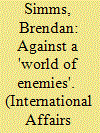

|
|
|
|
|
| Publication |
2014.
|
| Summary/Abstract |
Adolf Hitler's experiences during the First World War have been much discussed, with historians tending to concentrate on his involvement in the fighting and the operational lessons he later claimed to draw. Much less has been written about the impact of the war on his world view, though recent work has tended to suggest that his paranoid anti-Semitism was not yet visible during the conflict. Drawing on this latest research, but also on newly discovered sources and previously underused material, the author shows that Hitler's main preoccupation during the war and its immediate aftermath was the overwhelming power of Great Britain and its American ally. He associated these two powers with the alleged international Jewish economic conspiracy that had crushed the German empire. Hitler's anti-Semitism thus originated in an anti-capitalist, rather than anti-communist, discourse. He blamed Britain and the US for the rigours of the Versailles peace settlement, a moment which was far more politically formative for him than the experience of defeat itself. His encounter with American soldiers in the summer of 1918 also marked his first engagement with the global power of the United States and the start of a belief in the demographic weakness of the German empire which inspired his plans for Lebensraum in the east.
|
|
|
|
|
|
|
|
|
|
|
|
|
|
|
|
| 2 |
ID:
131700
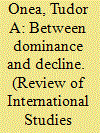

|
|
|
|
|
| Publication |
2014.
|
| Summary/Abstract |
This article investigates the role of status considerations in the response of dominant powers to the rise of emergent states. Accordingly, the hypothesis explored is that dominant actors are prone to fear that they will lose their upper rank, and, due to this status anxiety, resist the efforts of emergent powers to match or surpass them. The article begins by explaining why political actors deem status important and puts forward a theory of status anxiety in world politics. The more pronounced is this anxiety across status dimensions (economic and military capabilities as well as prestige), the higher the likelihood of conflict. This argument is then tested against competing theories of dominant power behaviour in two cases: the relations between France and Britain from the 1740s to Napoleon and those between Britain and Germany from the 1880s to World War One.
|
|
|
|
|
|
|
|
|
|
|
|
|
|
|
|
| 3 |
ID:
132004
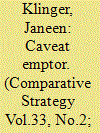

|
|
|
|
|
| Publication |
2014.
|
| Summary/Abstract |
Although intuitively social science has much to contribute to strategy, this article examines the difficulty for strategists doing so. To illustrate the difficulty, the article draws on two social science theories that provided conceptual frameworks for U.S. strategy in the 1960s: deterrence/coercion theory and modernization theory. The article also draws on the cases of Project Camelot in the 1960s and the recent use of human terrain teams to illustrate the difficulty encountered by the military when it tries to use social scientists operationally.
|
|
|
|
|
|
|
|
|
|
|
|
|
|
|
|
| 4 |
ID:
133512
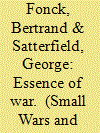

|
|
|
|
|
| Publication |
2014.
|
| Summary/Abstract |
In the late seventeenth century during the Dutch War (1672-1678) and the Nine Years War (1688-1697), French armies relied on small war for the accomplishment of essential tasks and as part of an overall strategy of exhausting their opponents in the Low Countries. The purposes of small war included the imposition of contributions on enemy populations, the destruction of the enemy base of operations, blockades of fortresses, and the general support of campaign armies. The expression 'small war' in the French language appeared with growing frequency in the 1690s. Small war can be viewed as both a cause and consequence of the characteristics of these wars. The limited policy goals of Louis XIV the king of France required a strategy that minimised risk and accomplished the goal of reducing if not eliminating the Spanish presence in the Low Countries that bordered the north of France. As French armies increased in size during this period, the demand for specialists at small increased in order to provide security and ensure supply. Small war in the late seventeenth century was thus not ideologically motivated insurgency, but in the minds of French commanders an essential component of strategy and the nature of war.
|
|
|
|
|
|
|
|
|
|
|
|
|
|
|
|
| 5 |
ID:
133516
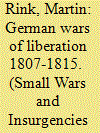

|
|
|
|
|
| Publication |
2014.
|
| Summary/Abstract |
In the Age of Napoleon, 'small wars' and 'revolutionary war' were closely connected. There were, however, different strands of this phenomenon: speaking professionally, conservative officers condemned small wars as an irregular regression to previous less disciplined forms of warfare. The Prussian state continually tried to discipline and regulate spontaneous risings. Yet the irregular character of small wars offered the opportunities for a less complex way of fighting, thus enabling the arming of the 'people' to fight. Individual undertakings, such as Ferdinand von Schill's doomed campaign in 1809, were designed to spark off a general popular uprising. But they were cheered by many and supported by few. Meanwhile, Neidhardt von Gneisenau conceived guerrilla-style Landsturm home-defence forces, which were designed for an irregular people's war. These concepts were put into practice in the 'war of freedom' - or 'war of liberation' - in 1813. Eventually both the mobilisation and the tactics remained regular, however, despite the emphatic appeal to a national 'people's war'.
|
|
|
|
|
|
|
|
|
|
|
|
|
|
|
|
| 6 |
ID:
047872
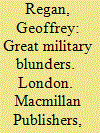

|
|
|
|
|
| Publication |
London, Macmillan Publishers, 2000.
|
| Description |
191p.
|
| Standard Number |
0752218441
|
|
|
|
|
|
|
|
|
|
|
|
Copies: C:1/I:0,R:0,Q:0
Circulation
| Accession# | Call# | Current Location | Status | Policy | Location |
| 043523 | 355.02/REG 043523 | Main | On Shelf | General | |
|
|
|
|
| 7 |
ID:
131845
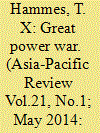

|
|
|
|
|
| Publication |
2014.
|
| Summary/Abstract |
Proponents of a wide range of power transition theories suggest that conflict between the United States and China is inevitable. History indicates that is not true and conflict can be deterred. A key element to that deterrence is an effective Alliance strategy. While the Obama Administration has outlined an effective deterrent national strategy, it has not provided any military strategy. Some have proposed Air Sea Battle can be that strategy. For a variety of reasons, ASB will not work. This article proposes the Alliance adopt Offshore Control as a military strategy to deter China and assure allies and friends in the region. It is based on the concept of defending the first island chain, denying China use of the seas inside the first island chain and dominating the seas outside it. Its deterrent power is enhanced because Offshore Control is affordable, politically feasible, and can be executed today.
|
|
|
|
|
|
|
|
|
|
|
|
|
|
|
|
| 8 |
ID:
132796


|
|
|
|
|
| Publication |
2014.
|
| Summary/Abstract |
Following the successful conclusion of the "India and the Great War' international conference held at the USI from 05-07 Mar 14 (see report in the USI Journal of Jan-Mar 2104 pp. 112-126) considerable interest was generated both nationally and internationally in the project. This was reflected in the spike in number of "hits" on the project's internet based platforms including the Facebook and Flickr pages. The Inaugural and Valedictory speeches of both, the Hon'ble Vice President and the Foreign Secretary, respectively, were featured on their own websites and served to generate greater awareness about the project as well as
to act as a stimulus for greater official involvement in the numerous activities planned to highlight India's role in the war on an international platform.
|
|
|
|
|
|
|
|
|
|
|
|
|
|
|
|
| 9 |
ID:
131487
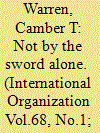

|
|
|
|
|
| Publication |
2014.
|
| Summary/Abstract |
Scholars of civil conflict have long recognized the importance of state strength in the suppression of nascent insurgencies. However, previous empirical investigations have generally focused on the material and coercive dimensions of state power, obscuring the critical role played by the generation of widespread voluntary compliance through processes of political communication, that is, the production of "soft power." In contrast, in this article I focus on a factor-mass communication technology-that can enhance state capacity only by strengthening the state's ability to broadly and publicly disseminate political messages. I argue that the enhanced capacities for large-scale normative influence generated by mass communication technologies can be expected to produce substantial barriers to the mobilization of militarized challenges to state rule, by strengthening economies of scale in the marketplace of ideas. Utilizing newly compiled cross-national data on mass media accessibility in the post-World War II period, I show that densely constituted mass media systems dramatically reduce the probability of large-scale civil violence, thereby providing new evidence for the fundamental importance of nonmaterial state capacities in the suppression of internal armed conflicts.
|
|
|
|
|
|
|
|
|
|
|
|
|
|
|
|
| 10 |
ID:
132455
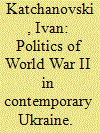

|
|
|
|
|
| Publication |
2014.
|
| Summary/Abstract |
This study examines the role of political factors in attitudes toward World War II in contemporary Ukraine. The research question is which factors determine public views of the principal warring sides and their leaders in Ukraine. The analysis of the 2012 Kyiv International Institute of Sociology survey shows that regional values, political party preferences, ethnicity, language, and age have significant effects on views of the Red Army and the Ukrainian Insurgent Army (UPA) during the war and attitudes toward the wartime activities of Joseph Stalin and Roman Shukhevych. Public perceptions of the German Army and Adolf Hitler in Ukraine do not vary much across regions, political parties, and ethnic, language, age, and sex groups.
|
|
|
|
|
|
|
|
|
|
|
|
|
|
|
|
| 11 |
ID:
133957
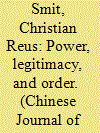

|
|
|
|
|
| Publication |
2014.
|
| Summary/Abstract |
Legitimacy is not something distinct from power; it is one of the vital sources of power. And if power shapes the nature and development of international orders, then the politics of legitimacy features prominently in the construction, maintenance, and dissolution of such orders. This article begins by exploring the concepts of power and legitimacy, their theoretical interconnection, and the impact that crises of legitimacy have on the maintenance of political power. It then takes an empirical turn, examining, however briefly, two sites in which the politics of legitimacy had a profound effect on the development of the modern international order. The first concerns the globalization of the system of sovereign states, a four-century long process of imperial extension, crisis, and fragmentation into successor states, a process in which struggles over individual rights played a key role. The second concerns the definition and distribution of special responsibilities for managing functional challenges among states. In orders characterized by formal sovereign equality, on the one hand, and imbalances of material capabilities, on the other, a mechanism needs to be found for containing and harnessing power to meet the problems faced by the international community. Historically, this has been achieved through the allocation of special responsibilities to particular states, usually great powers. But if regimes of special responsibilities create patterns of more or less formal hierarchy among states, they are also sites of intense battles over legitimacy.
|
|
|
|
|
|
|
|
|
|
|
|
|
|
|
|
| 12 |
ID:
132008
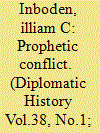

|
|
|
|
|
| Publication |
2014.
|
| Summary/Abstract |
This article traces the development of Reinhold Niebuhr's growing alarm over the rise of Nazi Germany and Imperial Japan leading up to World War II, and his corresponding warnings to the United States and allied powers of the need to confront fascist aggression. The theme of the "prophetic" shaped Niebuhr's perception of the threat of fascism, both through his concern over the religious liberty of Christian and Jewish voices to bring prophetic judgments against totalitarian governments and through his predictions of the threat that fascist regimes posed to the international order. In the course of the 1930s Niebuhr also refined his doctrine of Christian realism, which both influenced yet differed from the evolution of realism as a theory of international relations. Niebuhr's development over this decade also marked his transition from the margins to the center of American intellectual and political life.
|
|
|
|
|
|
|
|
|
|
|
|
|
|
|
|
| 13 |
ID:
133978
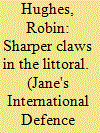

|
|
|
|
|
| Publication |
2014.
|
| Summary/Abstract |
In May 1982 the UK Royal Navy (RN) rushed the then brand new sea Shua anti ship missile into service in the South Atlantic. Equipping the similarly new Lynx HAS.2 small ships' helicopter, Sea Shua has been developed by British Aerospace Dynamics to give the Lynx a powerful punch against the missile-armed fast attack craft and corvettes, then proliferating in Soviet and Warsaw pact navies.
|
|
|
|
|
|
|
|
|
|
|
|
|
|
|
|
| 14 |
ID:
132009
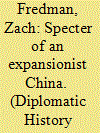

|
|
|
|
|
| Publication |
2014.
|
| Summary/Abstract |
The Chinese Revolution, Korean War, and McCarthyism loomed large over Kennedy administration assessments of Chinese intentions in Vietnam. The president and his advisors disagreed over the exact nature of the Chinese threat, but they uniformly believed in a dangerous, expansionist China. Their assessments promoted cautious escalation in Vietnam, where Kennedy sought to avoid "losing" another Asian country to Communism without provoking another war like Korea. This, in turn, promoted Chinese militancy. Central to Kennedy administration thinking was the idea that Vietnam served as a test case for Beijing's more radical foreign policy line vis-à-vis Moscow. This article traces the development and influence of such assessments. It also argues that the China factor informed Kennedy and Johnson administration notions of credibility. Holding back or reversing Communist gains in Asia by supporting Saigon offered these administrations the chance to kick once and for all the "who lost China" stigma that had haunted the Democratic Party since 1949.
|
|
|
|
|
|
|
|
|
|
|
|
|
|
|
|
| 15 |
ID:
132013
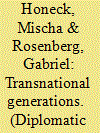

|
|
|
|
|
| Publication |
2014.
|
| Summary/Abstract |
The Cold War had just turned hot on the Korean Peninsula in late June 1950 when Deon Smith, a young Boy Scout from Mt. Vernon, Illinois, pitched his tent in Valley Forge. Fears of a global cataclysm loomed over the Revolutionary War battlefield, where nearly 50,000 Boy Scouts from the United States and twenty allied nations had gathered to celebrate Independence Day. Their jamboree marked the biggest encampment of youth on American soil to date, big enough to garner an address by President Harry Truman. "I hope that you young men … will take home from this jamboree a clearer understanding of the meaning of human brotherhood," said Truman. "I hope that you will work for freedom and peace with the same burning faith that inspired the men of George Washington's Army here at Valley Forge."1 Given the geopolitical context, the subtext was clear: "freedom and peace" required the "burning faith" of fighting men. Irony, as well as faith, burned in Truman's comments. Beyond the rhetoric of global brotherhood, Truman's internationalist overtures obscured particular national geopolitical interests on the peninsula and cast communism as an inhuman menace. Meanwhile, even as the grand statesman rallied the crowd, Deon Smith was busy forging international ties of his own-ties that did not grow out of security concerns but were driven by juvenile excitement and curiosity. He took part in various "Scoutcraft events" and "inter-camp visits," traded souvenirs with his distant peers, and formed friendships with Scouts from near and far. "Some of the most interesting groups we have met," Smith wrote, "are the Scouts from foreign lands," including boys from the former enemy nations of Germany and Japan. In this, Smith explored internationalism rather than merely assuming it. Who, then, assembled universal brotherhood more decisively at this jamboree: the president, whose speech recoded the chaos, flux, and pleasures of a sprawling encampment in the overdetermined, ironically nationalist registers of liberal internationalism, or the boy, whose handshakes gave literal flesh to Truman's rhetoric?2
|
|
|
|
|
|
|
|
|
|
|
|
|
|
|
|
| 16 |
ID:
131563
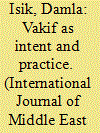

|
|
|
|
|
| Publication |
2014.
|
| Summary/Abstract |
Through ethnographic and archival research conducted in Istanbul and Izmir, this article examines the dynamics and regulation of charitable giving in contemporary Turkey. The article is based on interviews I conducted with the volunteers, employees, and aid recipients of three civil society organizations that rely on charitable giving to fund their projects, which center on helping the poor and providing aid during and after wars and other disasters. I document how religious ideals of anonymous charitable giving for the sake of giving, without expectation of return, are closely intertwined with anxiety over finding a worthy charitable association and recipient. In doing so, I focus on vak?f as both a concept and a practice that gives meaning to charitable giving in Turkey. The increasing desire to document, define, and categorize the deserving poor as a way to justify the intent to give and to receive goes against the anonymity and immediacy of giving, thus riddling intent with ethical contradictions. I argue that attention needs to be paid to the intent, practice, and various forms of giving, and not just to the effects and outcomes of charity.
|
|
|
|
|
|
|
|
|
|
|
|
|
|
|
|
|
|
|
|
|